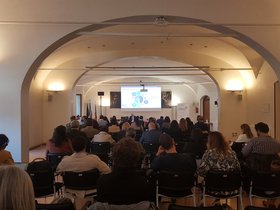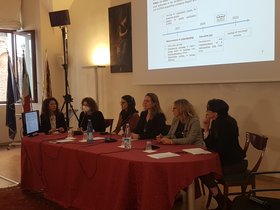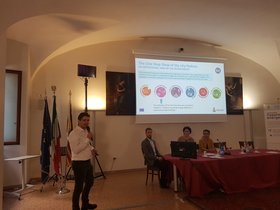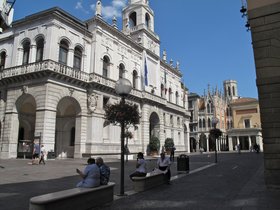The event constituted the final event of our project on One-Stop Shops (OSS) initiatives in Padova and beyond. We focused on why our project is all the more important in this day in age, the challenges that it will need to overcome, and how it will benefit the city of Padova and other OSS initiatives.
The PadovaFIT Expanded project held its final hybrid event on October 28th in Padova, Italy from 9:00 to 17:00 CEST. The event covered everything from the importance of this project’s success to the different challenges that carrying out such an ambitious vision would entail. It also featured an all-female star panel of engineers, architects and researchers that discussed topics around renovation, OSS, and the importance of energy efficiency.
The event commenced with Andrea Ragona, Padova's Environmental Councillor, taking centre stage and starting it off with a conversation about the ecological transition. He noted the rising importance of implementing an ecological transition due to the ongoing war in Ukraine and the resulting energy deficit.
Furthermore, the ecological transition, regarding the environment, is still ever important with the number of droughts and other environmental changes increasing. Mr. Ragona comments that though some perceive this transition as negative, “it is actually the only way forward.” He also brought up how this project will benefit the less fortunate members of society the most, as they tend to take the brunt of the prevailing energy issues.
As the event moved on, Christophe Milin from CINEA—who is already known to our project from many other events, went on to talk about the large-scale roll-out of integrated home renovation services in Europe. He, then, laid out the two main problems of large-scale renovations:
1. The Human Factor—Most individuals/citizens are not professionals in EE refurbishment, energy management, or housing management and, therefore, can’t be expected to make the necessary changes themselves.
2. Huge Need for Home Renovations but Little Demand—While there is a large need for home renovations, there is little demand due to the complexity of actually carrying out those renovations.
As a solution to these problems, Milin explains how Minimum Energy Performance Standards (MEPS) will need to take the lead by setting a standard that would ensure a certain energy rating for each property will be met. As a result, demand for such renovations will increase.
Daniela Luise—the coordinator of PadovaFIT Expanded and the Local Agenda21 in Italy—concluded the event with a talk on replicating the OSS model and the future opportunities it will bring within the “100 Climate Neutral and Smart Cities Network.”
One such opportunity is the number of jobs that will be created. In order to bring the city of Padova into a greener future, renovations on a large scale need to be completed. As a result, local contractors and the city of Padova itself will benefit from an influx of new jobs.
With that, the OSS conference came to an end leaving local policymakers, researchers, and other representatives of EU-partner projects with a model for how to set up a One-Stop Shop for the renovation of residential buildings—with the city of Padova becoming a standard for other future cities such as Timişoara (Romania),Vidin and Smolyan (Bulgaria) to follow.
This event was organized and led by the Municipality of Padova with the support of Climate Alliance, and an active participation of all our project partners either as panel moderators or event speakers.
For more information and news on the PadovaFIT Expanded Project, please visit our website here.






